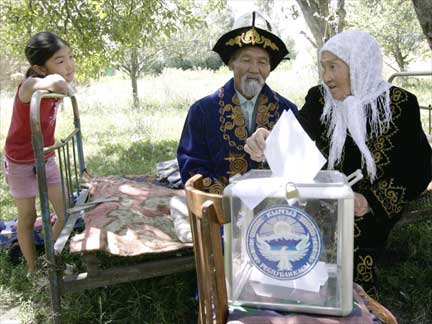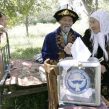
Kyrgyzstan’s Awaits a New President
Publication: Eurasia Daily Monitor Volume: 8 Issue: 35
By:

After experiencing a tumultuous 2010, Kyrgyzstan is facing yet another decisive test this year. Presidential elections planned for November-December 2011 will determine whether the positive trends seen in the past few months in Kyrgyzstan will continue after the incumbent leader Roza Otunbayeva steps down. The election’s exact date will be announced in June (www.rian.ru, February 10).
Leaders of at least four parties represented in the parliament are the most likely presidential candidates. The leader of the Social Democratic Party in Kyrgyzstan, Almazbek Atambayev, Respublika’s, Omurbek Babanov, Ata-Jurt’s Kamchybek Tashiyev and Felix Kulov, a former KGB officer and head of Ar-Namys party are likely currently considering running for the presidency. They will likely compete with the former Deputy Prime Minister, Azimbek Beknazarov, and a flock of leaders from parties not represented in the parliament (www.ca-news.org, February 3).
The next president’s role will be decisive in three ways. First, the new president may be unable to resist the urge to centralize power in his own hands instead of strengthening the parliamentary system of governance in line with the constitution adopted in June 2010. Moreover, the next president’s ability and interest to unite the country across ethnic and regional lines will determine Kyrgyzstan’s future political climate. Similar to former President, Kurmanbek Bakiyev, the new leader might be interested in artificially fueling division in the country to justify a drift towards authoritarian policies. Finally, the new leader might refuse to give up his power through future elections. Even if the new president avoids centralizing power in his own hands, he will still prefer to secure the continuity of his own power through rigging both parliamentary and presidential elections. Otunbayeva might remain the first the only president in Central Asia to transform power through elections for many years to come.
Although Otunbayeva has already achieved significant progress in bringing about constitutional change, organizing free and fair elections and increasing transparency in governance, her legacy might be easily squandered by the next leader. Most of the achievements to date were to a large extent due to her genuine understanding of democratic values, as well as personal determination to set an example as a leader who puts the country’s interests ahead of her own. But Kyrgyzstan’s political institutions are too fragile to guarantee that the president’s legacy will remain intact. Furthermore, Russia’s potential to predetermine the election result is almost unavoidable. The Russian leadership has been openly criticizing Kyrgyzstan’s parliamentary system. Most Kyrgyz experts believe that the Kremlin will either choose to support a specific candidate or several candidates with the highest chances to succeed. Either way, Russia will try to develop close relations with the new president. All four leaders who may run for the presidency have already built strong ties with the Kremlin (https://www.ca-news.org, February 10).
Otunbayeva is also the only female politician able to operate in the male-dominated political environment. Otunbayeva’s experience is unlikely to be replicated soon, particularly given that not a single female leader holds a key governmental post, while most women in the parliament were able to earn mandates thanks to special quotas secured by the electoral code. A similar logic applies to ethnic minorities.
Meanwhile, Kyrgyzstan still lives under the constant threat of repeated ethnic clashes not only in parts already torn by conflict but in other areas of the country (www.centrasia.ru, January 26). Ethnic minorities feel insecure and more detached from the political process. Any disturbances before the elections will increase voters’ preference to see a strong leader in power. An eruption of violence similar to the June 2010 ethnic conflict that claimed lives of over 450 people will increase the chance of parties advocating a return to the presidential system of governance to prevail in the elections.
Like the parliamentary elections in October 2010, the upcoming presidential elections are likely to take place in an environment of unpredictability, in which all candidates will have free access to the mass media and an ability to campaign without government pressure.
Unfortunately, however, none of the prospective candidates have so far shown interest in ensuring that all three criteria are met. Realistically, if free and fair elections were held in Kyrgyzstan tomorrow and each voter’s choice is counted, the country’s next president is likely to be a pro-Russian male nationalist, possibly in military uniform. The current mood of the society is such that the ethnic majority, especially in southern Kyrgyzstan, wants to see a strong leader who would consider ethnic Kyrgyz as the country’s chief group.




